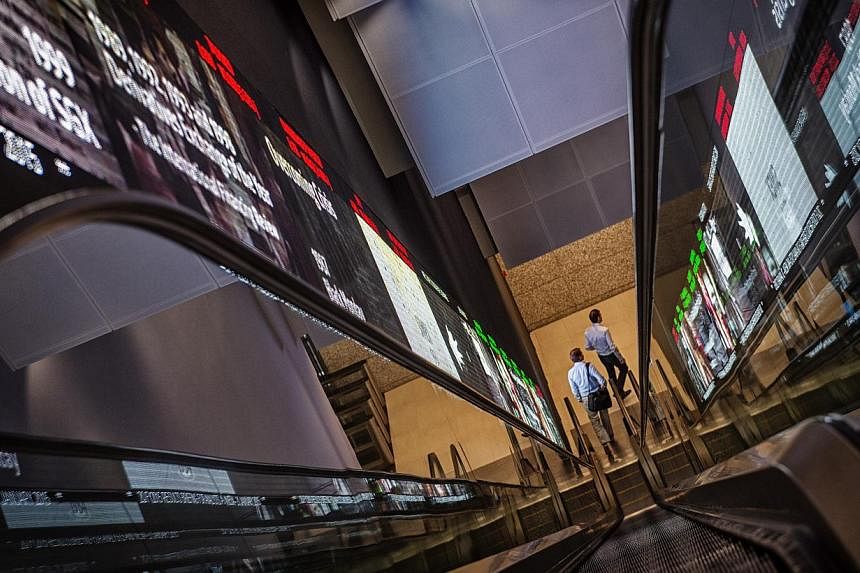SINGAPORE (Bloomberg) - It's a tough time to be an investment banker in South-east Asia.
Singapore, the region's biggest stock market, is having its driest spell in six years with no initial public offering bigger than US$25 million (S$33 million) in 2015. Mergers involving South-east Asian companies have dropped 45 per cent this year to the lowest level since 2009, bucking a 39 per cent rise in the broader Asia Pacific.
Adding to the woes, more than a fifth of all acquisitions, or US$43 billion worth, announced in the past 12 months were scrapped, data compiled by Bloomberg show.
The dearth of mergers, down to US$20 billion, is taking a toll on bankers. Goldman Sachs has reduced its investment-banking team in Singapore about 30 per cent, while HSBC's top equity capital markets banker in the region and the merger heads at Bank of America and UBS are departing. Companies are reluctant to do deals or go public in the wake of low commodity prices that have curtailed growth in South-east Asian economies including Malaysia and Indonesia.
"The mood on the street is very dismal," said Nicholas Teo, a Singapore-based strategist at CMC Markets. "In South-east Asia, the big companies and tycoons have been sitting on the sidelines."
Representatives for Bank of America, HSBC and UBS declined to comment.
"While our South-east Asia strategy and client coverage model remains unchanged, we do expect activity levels to be challenged," Tim Leissner, chairman for South-east Asia at Goldman, said by e-mail. Leissner said Goldman sees opportunities from the consolidation of Vietnamese and Indonesian banks.
Falling oil prices earlier this year helped undo several announced deals. CIMB Group Holdings Bhd in January terminated a US$20 billion three-way merger that would have formed Malaysia's biggest banking group, citing unfavourable economic conditions following the plunge in oil prices. The same day, Sona Petroleum Bhd abandoned a proposed US$281 million investment in Thai energy assets.
Another withdrawn deal involved Thailand's richest man, Charoen Sirivadhanabhakdi, who in February abandoned plans to buy control of Singapore builder United Engineers Ltd after failing to reach agreement on price.
Last month, Malaysia scrapped a plan to seek buyers for the US$3 billion power arm of state investment company 1Malaysia Development Bhd, reversing course just a week after saying it appointed a bank to field interest in the assets. No reason was given. It will now pursue a long-delayed IPO of the business.
"There was certainly a sense of optimism three to four years ago, when both local and international banks were hiring aggressively," said Nick Gardiner, a Hong Kong-based managing director at Boston Consulting Group. "They probably didn't see the kind of activity levels they were hoping for."
Firms led by Standard Chartered and Macquarie Group have eliminated about 400 investment-banking jobs across Asia since the start of the year, according to Boston Consulting Group estimates. More cuts could come if deal flow continues to slow, Gardiner said.
One bright spot has been Thailand, which hosted Jasmine Broadband Internet Infrastructure Fund's US$1.7 billion February share sale. That accounted for more than half of IPO fundraising in South-east Asia this year. The only other IPO above US$500 million in the region was last month's US$770 million share sale from Malaysian power producer Malakoff Corp, Bloomberg data show.
Singapore's IPO activity has been hurt by an anticipated rise in interest rates. That dents the appeal of property trusts, which typically comprise many of the new offerings there, said Kelvin Ho, Nomura Holdings Inc's head of South-east Asia investment banking.
Only two companies sold shares in Singapore this year, raising a combined US$33 million, down from US$721 million a year earlier, and both have slumped from their offer prices. Singapore Exchange Ltd is trying to court mining companies, develop closer ties with China and attract IPO candidates from overseas as part of a goal to double the market value of companies listed there within five years.
There is little hope for deal activity to pick up this year, said Alan Richardson, a Hong Kong-based money manager at Samsung Asset Management Co.
"The growth outlook in South-east Asia is weakening and there's uncertainly over the global economy," he said.

